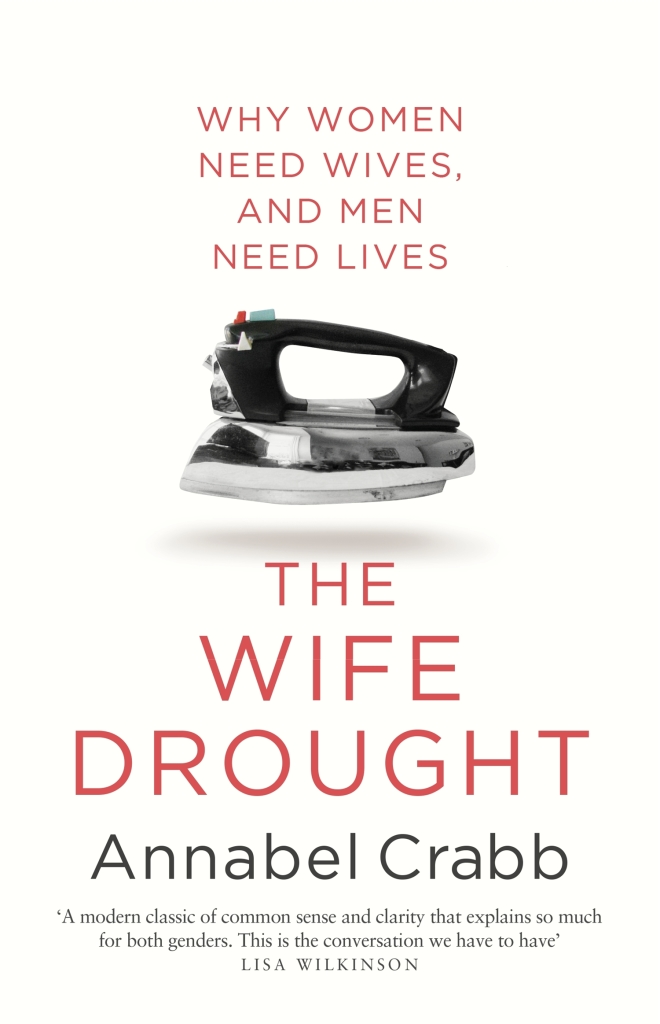 If Annabel Crabb and I weren’t both straight women I would kiss her passionately on the lips.
If Annabel Crabb and I weren’t both straight women I would kiss her passionately on the lips.
Finally, somebody explains clearly the impact of children, family responsibilities and the goddamn housework on a woman’s ability to participate fully in the workforce. Finally, somebody lays out the impediments men face in trying to have fully interactive lives with their children and partners when dealing with a workforce which still operates as if it was 1950.
Crabb, in her book The Wife Drought, lays bare the imperfect, fumbling way families patch together their lives. Decisions on the run, sacrifices made with little thought of what they mean in the long-term, choices and chances blended together in chaotic mix that we just hope balances out in the end.
But the truth is that families often don’t make concerted decisions about how they’re going to deal with certain circumstances; the circumstances arise, they make some ham-fisted, piecemeal attempt to deal with it, and that’s what sticks. This goofball lack of strategy is what makes human beings interesting. It’s also what makes us human.
Crabb deftly weaves together personal anecdotes, statistical analysis and various research projects to outline the current state of play in the fight for equality. It is refreshing to see someone openly assess what happens, for both men and women, when you add children to the mix.
The premise of the book challenges the current mode of thinking regarding equality.
What would happen if we stopped looking at this situation as one in which women are the victims, and started looking at what men miss out on?
Crabb is as committed a feminist as you will find but with this point;
And that’s why, for all the changes that the last five decades have held for women, the changes for men have been scandalously narrow. Men continue to be over-represented at work, and under-represented at home. Viewed one way, this is an unforgivable and continuing annexation of money, power and influence. Viewed the other way up, it’s a continuing tragedy for children and for men, bound tight into a web of expectations no one even asked them if they wanted.
she unleashes a school of thought which many dedicated to the cause would question as a “pro-men” argument when men are doing just fine and it’s women who need the help and support. However, by examining the issue from both perspectives, male and female, Crabb opens up the possibility of moving forward with a solution which allows for better lives for both parties.
Throughout The Wife Drought Crabb outlines very clearly the inequalities women have faced in participating in the workforce and gives us the latest (depressing) figures on the pay gap, females holding executive positions, women’s participation in the workforce and so on. What Crabb suggests though is that we ditch the “awful men, hopeless women” categorisation.
The tale of what happens to women at work cannot possibly be told, and much less understood, until we pan back and understand what’s going on with women outside the four walls of the workplace. Until you put work in context, and understand what other factors might influence women’s capacity to compete equally, all the awful men and hopeless women in the world will never quite explain why things continue to turn out the way they do.
Crabb’s gentle humour is sprinkled throughout the book, you will find yourself laughing out loud in parts; and I defy anyone to read the retelling of Lisa Annese’s (CEO of the Diversity Council of Australia) conference call from home without tears of laughter streaming down your face. Guys, it’s worth the price of the book alone. There’s mayhem, emotion and trauma all wrapped up into a ball of domesticity vs international business.
In concluding her book, Crabb points to the possibilities of technology to assist in changing the face of working life, and suggests maybe now it is men’s turn to change.
The certainty is this: as long as we continue to study, debate and agonise about what happens at work as if it is an entirely independent sphere from what happens at home, then we shall get no farther. For years, we have argued about quotas and affirmative action and all the ancillary techniques to move women up through the leadership ranks, but we’ve taken our eyes off the other half of the equation. In focusing so hard on encouraging women to lean in, we’ve neglected to convince men of their entitlement to lean out once in a while. The men who already do – who have the confidence to stare down the expectations of them that lace invisibly but unmistakeably through the world of work – will perhaps be the advance riders of the change.
Amen to that sister.
I sincerely hope this book can trigger a discussion on how the issues of home and family play out for both sexes. I also hope it does contribute to a rethinking of how our work places operate and how we can better manage productivity and advancement with LIFE.





I read an article Annabel had written on this and it really resonated. That’s it, I’m leaving to buy the book right now.
Head straight to the book store, do not pass go.
my contribution to this argument – Pro-Lie IS Pro-Women
http://themotherofnine9.wordpress.com/2014/10/27/pro-life-is-pro-women/
For as long as I can remember, I’ve been saying that if feminists focussed on equality as opposed to a better deal for women, as if that were the same thing, then men could become part of the solution and women could understand the extent to which they are part of the problem
I agree a focus on equality with both sexes working together to improve the situation would be the way to go.